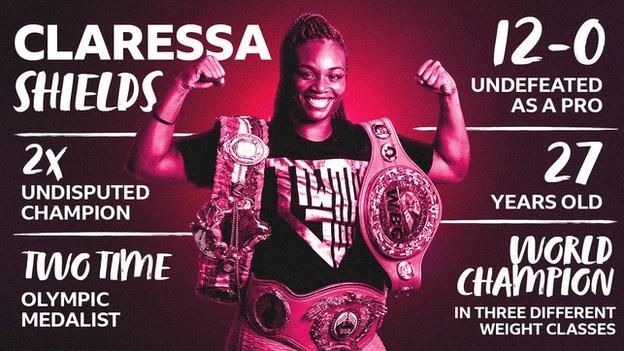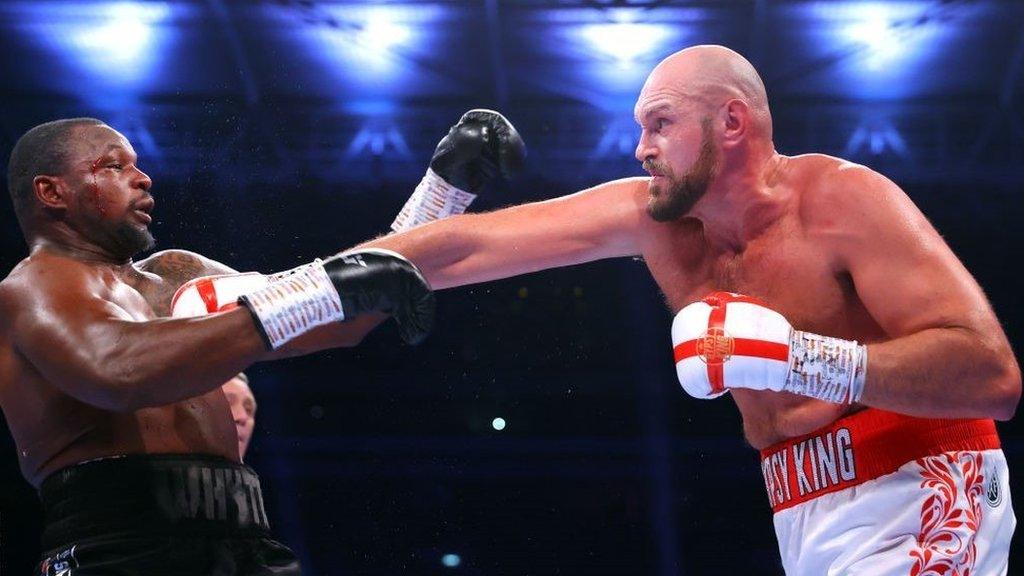Shields v Marshall: 'I was an angry kid' - the making of one of boxing's most remarkable champions
- Published

Claressa Shields has enjoyed a remarkable career
Claressa Shields v Savannah Marshall | |
|---|---|
Venue: O2 Arena, London Date: Saturday, 15 October | |
Coverage: Commentary on BBC Radio 5 Sports Extra from 19:30 BST and from 22:00 BST on BBC Radio 5 Live; live text commentary and reaction on BBC Sport website & app. | |
Claressa Shields is the brash, outspoken American boxer who toes the line between villain and superhero, as she puts it.
Google her name and you will find images and videos of a woman full of fire, never backing down from a fight, wherever it presented itself.
On Saturday night, she faces long-time rival and WBO champion Savannah Marshall in a contest for the undisputed middleweight championship.
But Shields wasn't always the force of nature she is now.
She cites her tough upbringing - where she didn't have a bed of her own to sleep in until she returned from the Olympics as a gold medallist aged 17 - for making her the fighter she is.
"People like to say I'm unhinged but I would say I'm a pretty great person. And I think Flint had a lot to do that," she says.
Watch Shields and Marshall weigh in before undisputed middleweight title fight
Shields was raised in Flint, Michigan in the United States. It regularly tops the charts as one of the US's poorest cities.
"I definitely grew up in poverty," she says, before rattling off an impressive list of elite athletes who hail from her city, such as boxing world champions Andre Dirrell and Chris Byrd.
"Flint gave me everything I needed to be successful in life. It gave me my street smarts, my book smarts. It gave me anger management, it gave me my belief in God, it gave me my struggles, it gave me my success, my supporters.
"It gave me a strong mindset and strong heart. It gave me confidence."
Anger management, however, is something Shields struggled with as a child. Her father was in prison until she was nine years old. "We spent a lot of time together, making up for lost time," she says of his eventual release.
Her mother was an alcoholic and would go missing for days. Shields had four siblings and lived on and off with her grandmother, who passed away in 2010.
"I was an angry kid, with all that I went through," she says.
Shields v Marshall: World champion rivals clash at original news conference
"Growing up in poverty, you're not happy. I didn't have a bed. Wouldn't that make you upset? There was no food in the house.
"A lot of stress on a young kid. You're supposed to be taken care of by your parents. Me, I was taking care of my siblings. I don't have a job, I don't have no money.
"I got just me and God, I got my grit. We'd spend days looking for my mom. That's what made me angry. I was sexually abused at the age of five.
"All those things made me look at people, at life, at things, way different than a regular kid."
Shields appears a whirlwind, even wears a 'GWOAT' - Greatest Woman of all Time - necklace, but in a quieter setting, away from the pressure cooker of media events and face-offs with Marshall, she is thoughtful and open.
Shields barely spoke as a child and developed a stutter. It is difficult to picture the woman who is so vibrant and forthcoming now was once that scared kid.
She would eventually tell a family member about the sexual abuse she suffered and found a safe space with her grandmother.
And then she found something that made her happy - boxing.
"I grew up watching my mom get into fights," Shields says. "My mom is where I get that passion for boxing from."
Clarence Shields, Claressa's father, was a well-known "underground fighter" in Michigan, nicknamed "Cannonball". He was once paid $100,000 (£90,000) for a fight, according to his daughter.
Shields convinced her reluctant father to sign her up for boxing at the age of 11. She was warned she had to stick at it for at least a year, considering the $60 fee.
"When I started boxing it just made happy. I was so mad all the time and finally, something that made me feel good," Shields says.
Archive: The incredible story of Claressa Shields
"I didn't think boxing would take me out of poverty, that wasn't my first thought. I liked doing it, I liked training.
"From there it went to liking sparring, liking running. Everything made me feel better. Even though I was dealing with a lot of things in my life, at least I get to spend two hours here where none of that matters."
It just so happens Shields was as talented as she was a hardworking. She surged through the amateur ranks beating every fighter she encountered, no matter the age or experience gap. In 2009, it was announced that women would be allowed to box at the 2012 Olympics.
Marshall has lived off amateur win for 10 years - Shields
Her only dream, however, was to be the first female Olympic boxing champion. She had no aspirations to turn professional.
"When I first came on the scene people would say you do not fight like a girl, you fight like a man," she says.
"But now that I'm a woman I say, I fight like a woman. A lot of these men wished they possessed the skills and the speed and the accuracy and the heart and the mindset as I do."
At the world championships in China in 2012, just a few weeks before the London Olympics, Shields met Marshall for the first time. They fought in the preliminary rounds.
She lost and it remains the only defeat Shields has suffered as a boxer. But she went on to win two Olympic golds and as a pro become a 12-time world champion in three different weight classes and undisputed champion in two different weight classes at the same time.
"No man has ever done that. I don't mean to brag but that's the truth," Shields adds.
Her long-awaited rematch with Marshall is being billed as the biggest fight in women's boxing history.
A fight 10 years in the making with two women headlining an all-female card at the O2 Arena in London for the first time.
Shields has a chance to add yet another accolade and wipe out the only blemish on a career as remarkable as it is unprecedented.
"We can't erase the loss in the amateurs because I don't care about it," she says.
"I don't care what people say. That's been a whole rise to greatness. They said becoming a two-time Olympic gold medallist was the hardest thing to do, it was impossible.
"People told me this but I did it. Beating Lomachenko's record, becoming a three-time division world champion, impossible. I did it.
"There's no way any fighter in history can become two-time undisputed champion, I did it. I don't really care what they say.
"The only thing that matters is what I say and what I feel and I'm going to knock out Savannah Marshall."

The champion of two courts ignored by the world: Ora Washington fought to make her name in racially segregated America
How is a jet engine made?: Go behind the scenes at the Rolls-Royce factory in Derby to find out

Related topics
- Published16 October 2022
